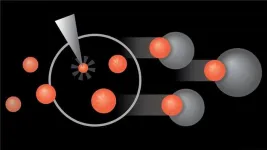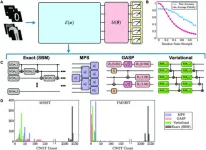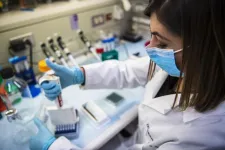The institute will bring together top scientists and clinicians to lead exceptional discovery, translational and clinical research that will deliver new insights in immunology and cell engineering, fueling the creation of transformational new treatments that can be rapidly adapted to address emerging needs in cancer, autoimmune diseases, infections and other conditions. These efforts already have been catalyzed by philanthropic and institutional support of more than $80 million.
The institute will be led by Katy Rezvani, M.D., Ph.D., vice president & head of the Institute for Cell Therapy Discovery & Innovation. Rezvani also holds the inaugural Melvyn N. Klein Family Endowed Directorship for the Institute for Cell Therapy Discovery & Innovation.
“Cell therapies have delivered profound results for patients with hematologic cancers, but there remain too many patients that do not benefit. It is critical to our mission to bring these promising therapies forward as options for patients with cancer and other conditions,” Rezvani said. “Through our discoveries, we aim to provide many more patients with effective cell therapies that are available as off-the-shelf treatment options, limiting the need for lengthy hospital stays and associated costs.”
Cell therapies, often described as ‘living therapies,’ are sophisticated immunotherapy treatments that use immune cells from a patient or healthy donor as building blocks. Through specialized engineering and manufacturing techniques, researchers can enhance the ability of these cells to detect and eliminate cancer cells, infected cells or otherwise abnormal cells.
The institute will integrate across MD Anderson’s unique research ecosystem to accelerate the discovery and development of new cell therapies from preclinical studies through clinical trials. MD Anderson’s extensive scientific and clinical expertise, highlighted by the world’s largest cancer clinical trials program and premier research institutes – the James P. Allison Institute and Institute for Data Science in Oncology – will enable institute researchers to uncover new cell therapy targets and approaches. Collaborations with external researchers as well as biotechnology and pharmaceutical companies will further speed the pace of development.
“MD Anderson clinicians and researchers have been instrumental in shaping the cell therapy field, and we are proud to take this important step into the future,” said Peter WT Pisters, M.D., president of MD Anderson. “The Institute for Cell Therapy Discovery & Innovation is a key piece of our institutional strategy, as we focus on cancer breakthroughs to improve patient outcomes. Our world-class facilities, exceptional talent and unique research environment will enable our teams to deliver transformational new medicines and to further our efforts to maximize our impact on humanity to finally end cancer.”
Building on a robust research platform and previous discoveries
As leaders in cell therapy, MD Anderson researchers have an extensive history of cell therapy research and development in the preclinical and clinical setting. To date, the Food and Drug Administration (FDA) has approved six chimeric antigen receptor (CAR) T cell therapy products targeting CD19 and BCMA for B-cell lymphomas, leukemias and multiple myeloma, with several approvals based on clinical trials led by MD Anderson researchers.
MD Anderson also was the first to advance CAR natural killer (NK) cells into clinical studies for patients with lymphoid malignancies, based on cord blood-derived CD19 CAR NK cell therapies developed by Rezvani and her team.
Additional MD Anderson research has shown progress for new cell therapies in solid tumors, with numerous preclinical studies and clinical trials in progress. Some key published and presented research findings include:
Adoptive T cell receptor (TCR) therapy targeting MAGE-A4 achieved clinically significant results for patients with multiple solid tumor types in a Phase I trial Novel CD70-targeting CAR T cell therapy delivered promising early results in patients with metastatic clear cell renal cell carcinoma Engineered NK cells expressing interleukein-21 or missing the TFG-β receptor demonstrated strong antitumor activity against glioblastoma cells CAR NK cells expressing a second CAR molecule improved tumor specificity and enhanced NK cell activity Adding CD28 costimulation to CD70-targeting CAR NK cells enhanced antitumor activity and long-term cytotoxicity “For years, our talented scientists and clinicians have been at the forefront of discovery, understanding and development of novel cell therapies,” said Giulio Draetta, M.D., Ph.D., chief scientific officer at MD Anderson. “By integrating with experts across the research and clinical enterprise, the Institute for Cell Therapy Discovery & Innovation will be able to create important new treatments, tailored to unmet patient needs, in ways only possible here.”
Researchers at MD Anderson, home to the world’s largest cord blood bank, will continue to explore cord blood-derived NK cell therapies and investigate alternative sources, such as induced pluripotent stem cells (iPSCs), for NK cells, T cells, B cells and macrophages, all of which may be used for cell therapies. Researchers will investigate and identify additional targetable tumor antigens and immune signaling molecules, which play a key role in immune cells’ ability to eliminate tumor cells and reduce damage to healthy cells.
While cancer is a core focus of the institute, MD Anderson researchers’ extensive knowledge of cell biology and engineering also provides possibilities to develop cell therapies in autoimmune diseases and infections. Abnormal B cells can cause multiple autoimmune diseases, including Graves’ disease, rheumatoid arthritis and multiple sclerosis, and cell therapies could improve upon current steroid and immunosuppressive treatments.
Further, Rezvani’s team has successfully developed cell therapies that show promise in treating rare and often fatal brain infections as well as viral infections that can arise after stem cell transplants.
Bringing together top minds and the next generation of scientists
In addition to Rezvani’s leadership, clinical and research leaders at MD Anderson will come together to help manage and oversee the institute’s research efforts. An Internal Advisory Council will provide guidance and scientific input on the research projects, offering recommendations on new research proposals submitted to the institute. A Pipeline Review Committee will ensure research and development projects align with the institute’s overall strategic objectives.
The institute also established an Executive Advisory Board, comprised of top minds from around the world, to provide guidance and input on the work of the institute.
Recruitment and retention of top scientists in bioinformatics, cell therapy research and cell engineering are priorities to bolster research initiatives. In addition, supporting the research of young scientists with promising ideas is a key element of the institute’s work to advance cell therapies. The institute will establish a fellowship program to create an opportunity to mentor, recruit and educate the next generation of researchers.
More than $80 million in support funds advancement, accessibility of cell therapy
Philanthropic support from around the world will further fuel discovery, research and talent within the institute. To date, more than $80 million – over half of the institute’s fundraising goal – has been raised to aid in researchers’ investigation, development and manufacturing of next-generation cell therapies for cancer patients. Much of this support is directed to underwriting clinical trials that will accelerate treatments to the bedside.
“The unparalleled generosity of our dedicated donors has provided an incredible foundation for the institute, supporting the advancement and accessibility of cell therapies from the very beginning,” said Rezvani. “On behalf of our team and our patients, thank you for your foresight and confidence in science. Together, we will end cancer.”
The institute has received lead commitments from Meg and Kirk Gentle, Lindonlight Collective, The Marcus Foundation, Inc., The Margery L. Block Foundation, Melville Foundation and Tanoto Foundation and additional significant support from The James B. and Lois R. Archer Charitable Foundation, Ann and Clarence Cazalot, The Cockrell Foundation, The Cyvia & Melvyn Wolff Family Foundation; Vijay and Marie Goradia, Melvyn N. Klein, Marek Family Foundation, Gayle Stoffel, The McCombs Foundation, The Walters Family, and MD Anderson’s Accelerator Fund. These gifts and more provide a strong foundation for the institute today as fundraising continues toward a total goal of $150 million.
“We are grateful to the many donors who have supported our work in cell therapies for many years, particularly our generous lead and significant benefactors and our MD Anderson Cancer Center Board of Visitors members,” said Pisters. “Through their continued commitment to our mission, our hope is that the discoveries of today will sooner help more cancer patients, across more diseases and disease sites, putting us further on the path to Making Cancer History®.”
- 30 -
About MD Anderson
The University of Texas MD Anderson Cancer Center in Houston ranks as one of the world's most respected centers focused on cancer patient care, research, education and prevention. The institution’s sole mission is to end cancer for patients and their families around the world, and, in 1971, it became one of the nation’s first National Cancer Institute (NCI)-designated comprehensive cancer centers. MD Anderson is No. 1 for cancer in U.S. News & World Report’s “Best Hospitals” rankings and has been named one of the nation’s top two hospitals for cancer since the rankings began in 1990. MD Anderson receives a cancer center support grant from the NCI of the National Institutes of Health (P30 CA016672).
© 2024 The University of Texas MD Anderson Cancer Center
END





